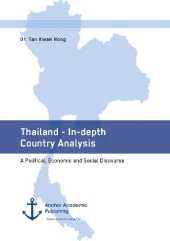 Neuerscheinungen 2016Stand: 2020-02-01 |
Schnellsuche
ISBN/Stichwort/Autor
|
Herderstraße 10
10625 Berlin
Tel.: 030 315 714 16
Fax 030 315 714 14
info@buchspektrum.de |

Tan Kwan Hong
Thailand - In-depth Country Analysis. A Political, Economic and Social Discourse
2016. 48 S. 12 Abb. 220 mm
Verlag/Jahr: ANCHOR ACADEMIC PUBLISHING 2016
ISBN: 3-9606706-7-2 (3960670672)
Neue ISBN: 978-3-9606706-7-4 (9783960670674)
Preis und Lieferzeit: Bitte klicken
For the following study and analysis of the domestic and foreign policy challenges of Thailand, the author consulted numerous Asian sources to capture a comprehensive view of the various challenges and risks faced. Political, economic and social challenges are all covered. Relevant country data and figures are also included.
Text sample:
Chapter 1.b. Current Challenges:
Political corruption:
Thailand´s growth has been stalled with massive levels of corruption. Indeed, extensive corruption in the country´s political and bureaucratic machinery has been a serious issue for many years. At the institutional level, it has traditionally hindered prospective investments. According to Transparency International´s 2010 Corruption Perceptions Index, which measures perceived levels of public sector corruption, Thailand ranked a dismal 78th out of 178 countries surveyed. Affirming this phenomenal is the World Bank´s 2010 Worldwide Governance Indicators, which ranked the country in the 46.9 percentile for control of corruption.
The country also faces a history of scandals. In August 2008, 44 people were involved in the THB1.4billionn (US$42 million) rubber saplings procurement scam during Thaksin Shinawatra´s administration. The Supreme Court´s Criminal Division for Holders of Political Positions subsequently charged them with alleged corrupted practices.
In 2009, the Customs Department was ranked the highest among all government agencies in terms of the number of complaints filed regarding corruption. Former Prime Minister Abhisit Vejjajiva´s government also wasn´t free from corruption scandals during their administration. The government´s then US$42 million stimulus package to combat recession was beset by procurement scams and corrupted deals due to patronage politics, leading to the resignation of two ministers. Accounting irregularities were discovered in the procurement of hospital equipments and school supplies and the award of construction tenders.
Most ridiculously, the chief of the Bhumjaithai Party, Chavarat Chanvirakul, was alleged to have auctioned provincial governor posts to the highest bidders, as well as indulging himself in real estate deals.
The Thai military, with a budget that has doubled since the 2006 coup, is also known to be a fertile ground for corruption and inflated costs.
Finally, Political parties squabbling over corruption charges could lead to political instability.
Poor governance indicators:
Thailand´s performance as measured by the World Bank´s Worldwide Governance Indicators has been a disappointment. In 2010, in the voice and accountability category, the country was awarded a percentile rank of 30.3, a significant decline from its year 2000 rank of 63.9. In terms of political stability, it ranked in the 12.7 percentile, a low score that resulted from the frequent military coups and government changes. In terms of government effectiveness, it was ranked in the 58.4 percentile, reflecting an administration of public agencies not free from political pressures, as well as the dismal quality of policy formulation and implementation.
Thailand was also ranked in the 56.5 percentile in terms of regulatory quality. This underpins the restrictive regulations on business, labor, and rights to property, on top of its inefficient bureaucratic functions which imposes unnecessary restrictions, further hampering investments.
Finally, in terms of the rule of law and the control of corruption, the country was ranked in the 49.8 and the 46.9 percentiles respectively. Both rankings are below that of Malaysia and Singapore.
Thus, Thailand still has much to improve on when proper and credible governance is concerned. A continued poor performance in these rankings will only inhibit Thailand´s growth in the long run.


